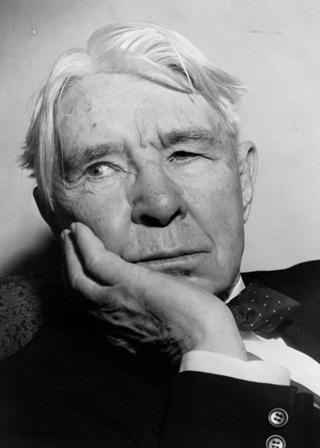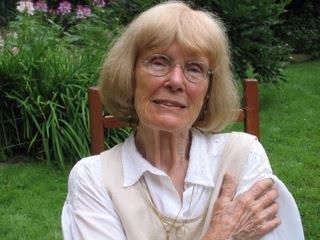Carl Sandburg? Isn't he that now-dead, silver-haired poet who read a work at the Kennedy inauguration?
No, that was Robert Frost.
I thought I knew a bit about Sandburg before previewing The Day Carl Sandburg Died, a new American Masters biography that premieres Sept. 24 at 10 p.m. ET on PBS (check local listings). I definitely knew a lot more after watching the excellent production, a fluid 90 minutes that interestingly lays out the life a poet, journalist, biographer, musician, musical archivist, political activist, husband, father and author of children's literature.
But even with my newly expanded knowledge of this unique man who was born in 1878 and died in 1967, it didn't stop me from confusing him with Frost during the early minutes of a recent interview with the program's producer-writer-editor.
Paul Bonesteel (right) ever so politely corrected me, while explaining that confusing these two large figures of 20th century literature isn't a rare mistake.
Not common, however, for a man who grew up just a mile away from the North Carolina home in which Sandburg lived much of his later life. And definitely not common for someone who has been working on this television production for seven years — a man who trimmed 45 minutes of almost-as-good material from what could have been the final cut in order to fit within the TV series' borders.
Most who know of Sandburg probably and happily will know more after watching the program. Those who know little or nothing of this man — he fell into the literary niche of the less-than-chic for many years after his death — probably will be amazed at the many facets of this man of letters who dropped out of school in the ninth grade to live a hobo's life for a time. There just aren't any convenient nooks into which his life fits.

Sandburg fought in the Spanish-American War, for example. But less than two decades later dangerously ran into a disapproving American government for his opposition to World War I — and luckily escaped being jailed or deported (his parents were Swedish immigrants) for his contacts with Bolsheviks while working as a news correspondent in Europe during that war. His frustration with what he saw as government's neglect of America's workers kept his activism perking through the Great Depression. But during World War II his patriotism and support for the Allied cause was constant. In later life, he was a man at least two presidents called on for counsel.
His hard-edged newspaper coverage of labor conflicts existed in the same realm that, as a father, inspired him to write and publish children's stories. He spent 20 years writing a scholarly biography of Abraham Lincoln, but he also loved performing — be it on the banjo or in the stage-quality reading of his works.
"I don't know if there is a voice like his who is doing today the things he did," said Bonesteel. "Sandburg's got so many story lines I could have gotten into."
Because Sandburg's star eclipsed for so many years after his death, Bonesteel knows familiarity with the man is quite a bit lower than it was when, in the 1960s, he and his work were made familiar from publication, to news coverage, even to appearances on Ed Sullivan's weekly variety show. He said he's hoping recognition of Sandburg's name will draw viewers who know little about him but are interested in learning more.
"I'm hoping a younger audience will see him as a figure they can identify with," Bonesteel said. He thinks it will be good to underline the fact that "dissident voices are OK in America" now as they were then.

Bonesteel's biography contains a wealth of interviews and archival material, including clips from television appearances, opinions of scholars and literary contemporaries such as Studs Terkel and Pete Seeger, an interview with Sandburg's only living daughter, Helga (left), and excerpts from a more-than-40 year-old interview the National Park Service did with Paula, the woman he married in 1908 and lived with for nearly 60 years.
The Day Carl Sandburg Died is something of a dichotomy: It's scholarly enough to be an essential part of any survey of American literature course, yet it's way to engaging to want to cut or sleep through.